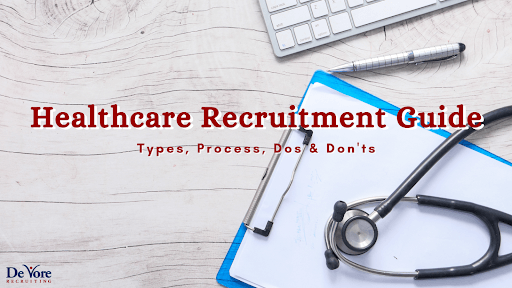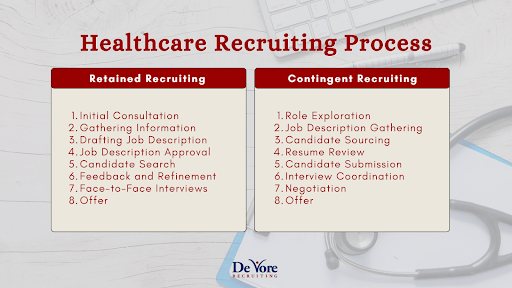Healthcare Recruitment Guide: Types, Process, Dos & Don’ts

In healthcare, getting the right people is vital. This guide breaks down how healthcare hiring works. It talks about what medical recruiters do and gives tips on the process. Plus, it shares what you should and shouldn’t do when hiring a healthcare recruiter. It’s all you need to know before making a hiring choice.
What is a Healthcare Recruiter?
Healthcare recruiters are specialized professionals dedicated to sourcing, screening, and placing candidates within the healthcare industry. They link healthcare organizations with skilled professionals. This helps to fill important roles in hospitals, clinics, nursing homes, pharmaceutical companies, and other healthcare settings. These recruiters work directly with various healthcare organizations to find and hire experienced candidates. They review applicants’ job experience, negotiate salaries, and place candidates in open positions. Recruiters help healthcare organizations like hospitals, nursing homes, and home health agencies find the right people for different positions. These include nurses, assisted living practitioners, physicians, physician assistants, RN supervisors, executive directors, and more.
What Does a Healthcare Recruiter Do?
The duties of a healthcare recruiter cover various aspects of talent acquisition. From crafting job descriptions and conducting candidate screenings to facilitating interviews and negotiating offers, their responsibilities span a wide range. Additionally, healthcare recruiters often provide valuable insights and guidance to both employers and candidates throughout the recruitment process, ensuring a seamless experience for all parties involved.
Types of Healthcare Recruiters
In healthcare recruiting, there’s no one-size-fits-all approach. Recruiters adapt their methods to suit the specific needs of healthcare organizations. Executive recruiting targets top-level leaders, while contract recruiting fills short-term roles. Permanent placement focuses on long-term hires for growth at all levels. Understanding these types of recruiting is crucial. It’s vital to know the different recruiting methods, why using a recruiter is beneficial, and the perks of each approach.
Retained Recruiters:
- Specialize in finding executives and highly-specialized talent such as Presidents, CEOs, and VPs
- Manage the entire search process, offering personalized service and a high-touch experience
- Tap extensive candidate networks to identify the best candidates for specific skill sets within niche domains
Contingent Recruiters:
- Operate in a competitive environment, often vying against other firms or internal HR departments
- Aim to present a wide range of candidates quickly to provide organizations with more options
- Leverage databases to identify potential matches swiftly and expedite the candidate selection process
Healthcare Recruiting Process

Navigating the healthcare recruiting process can be complex, requiring careful planning and execution at every stage. From initial consultation and candidate sourcing to final placement and onboarding, each step is critical to the success of the hiring process. Healthcare recruiters leverage their expertise and industry knowledge to streamline this journey, ensuring optimal outcomes for both employers and candidates.
Dos & Don’ts of Working With a Healthcare Recruiter
“Do’s” to Keep in Mind:
- Foster Honesty: Transparency regarding your organization’s needs, expectations, and preferences is crucial.
- Actively Listen: Pay close attention to the recruiter’s recommendations, especially regarding candidate qualifications and fit.
- Inquire: Seek clarification on any aspects of the recruitment process and share additional requirements or preferences.
- Maintain Engagement: Stay involved in the recruitment process by regularly providing feedback and expressing interest.
- Exhibit Professionalism: Maintain a professional demeanor in all interactions with the recruiter and their candidates.
“Don’ts” to Keep in Mind:
- Don’t Be Unresponsive: Keep the lines of communication open with the recruiter, particularly if you’ve lost interest in a candidate.
- Don’t Overwhelm: Refrain from excessive follow-ups that might be perceived as overly persistent.
- Don’t Take Rejection Personally: Understand that not every candidate will be the right fit, and use feedback for future improvements.
- Don’t Cross Boundaries: Avoid contacting candidates directly once the recruiter has presented them, to maintain the integrity of the process.
- Don’t Break Commitments: Show appreciation for the recruiter’s efforts by honoring scheduled interviews and avoiding last-minute cancellations.
Partnering with a Trusted Healthcare Recruiter
Look for a recruiter with a strong track record, industry expertise, and commitment to communication. By working closely with a trusted recruiter, you can confidently navigate the hiring process and reach your goals quickly. This will open up opportunities for career advancement and success in the healthcare field. Contact De Vore Recruiting and let’s discuss how we can specialize in finding the ideal healthcare recruitment solutions for your organization.
Advertisement: Our Healthcare Recruiting Services caters to a wide range of medical companies and healthcare offices. Contact us for more details or fill up the form below for any questions.
Tell us what you think
"*" indicates required fields




